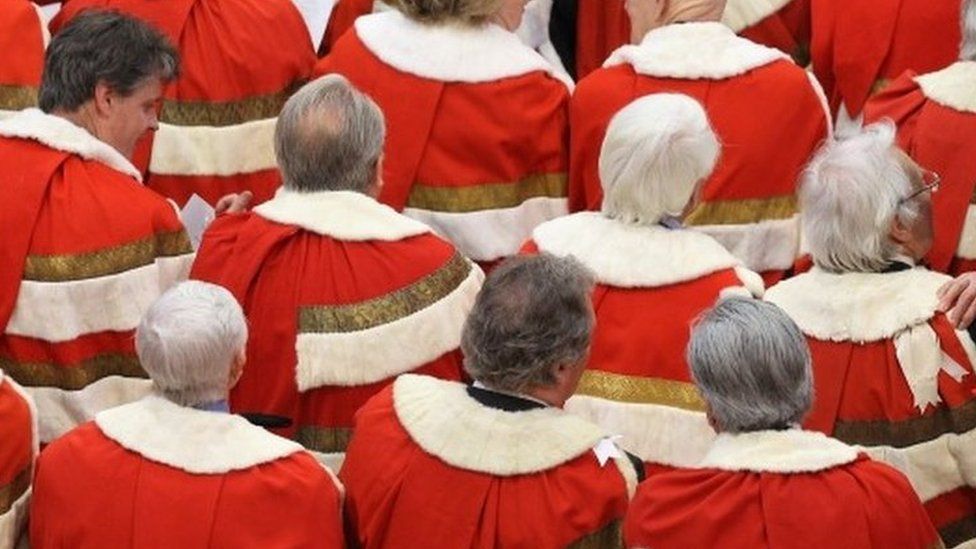Plans to curb House of Lords powers dropped
- Published
- comments

The government has decided against a new law to curb the powers of the House of Lords to block legislation.
Former House of Lords leader Lord Strathclyde came up with a proposal to remove peers' veto over laws - called statutory instruments - after a series of government defeats last year.
The government said it now had "no plans" for legislation on the issue.
But it warned peers it could reconsider unless they showed "discipline and self regulation".
The government announced its review into the workings of Parliament last year after defeats in the House of Lords over controversial tax credit cuts. Labour said the original plan had been an "absurd overreaction".
In a statement to peers, Baroness Evans, the leader of the House of Lords, said the will of elected MPs should prevail where there was a clash between the House of Commons and the House of Lords over a statutory instrument.
Why government wanted to shake up Lords
But she added: "We do not believe that we need to introduce primary legislation at this time."
Unlike with regular legislation, there is not currently a mechanism to assert the Commons' primacy on statutory instruments, so the government relies on the "discipline and self regulation that this House imposes on itself", she said.
"Should that break down we would have to reflect on this decision."
There have been claims the Lords could delay or block Brexit legislation, and Baroness Evans said when such laws are debated, "the constructive approach that this House has so far shown will be ever more important".
Analysis by BBC political editor Laura Kuenssberg
There are several reasons why the Strathclyde proposals are now never likely to see the light of day.
First, as if it needs saying, the political circumstances are transformed from this time last year. The government is trying not to fall into a black hole of Brexit, so some of the priorities of the previous administration that might have caused trouble in Parliament are being ditched.
Second, Theresa May is a pragmatist. These plans were deeply controversial, described as the Labour Lords leader as an "absurd overreaction", and themselves might have struggled to get through Parliament.
And third, sources have suggested that the government seems to want to rebuild a more traditional relationship with the Lords, dial down the confrontations and work more constructively together.
The change of heart is another policy planned by former Prime Minister David Cameron and former Chancellor George Osborne that Theresa May's government is abandoning.
One source said the reform had now "been dumped". Another added: "The world has changed."
Lord Strathclyde tells BBC Radio 4's The World at One why his Lords reform plans are on hold
It has been suggested to the BBC that the change is part of No 10 distancing itself from the previous administration, and part of its desire to pare back any legislation that might be controversial as the government prepares to face resistance in Parliament over its plans for leaving the EU.
Lord Strathclyde told the BBC it would be sensible if the government could find a way of working more effectively with opposition parties in the Lords without having to change the law, saying: "Legislation should be a last resort."
Baroness Smith, Labour's leader in the Lords, said she welcomed the government's realisation that "the Strathclyde review was an absurd overreaction to a sensible and principled challenge on tax credits".
Crossbench peer Lord Digby Jones said the move was a "big mistake" and risked peers blocking Brexit.
He told BBC Radio 4's Today programme: "I would have stuck to my guns because I think they're going to live to regret it on all of the Brexit stuff coming down the pipe."
But the Electoral Reform Society described the Strathclyde proposals as a "knee-jerk reaction to a government defeat", calling instead for "genuine Lords reform".
- Published28 October 2015
- Published7 November 2016
- Published16 November 2016